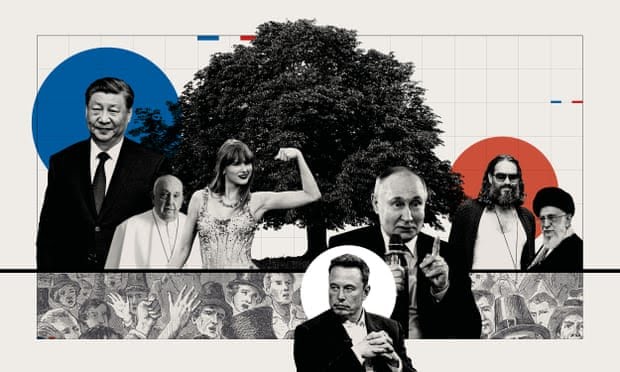CELEBRITY
Taylor Swift, the pope, Putin: in the age of AI and deepfakes, who do you trust?

If you wanted to find out what was happening in the world in Paris in 1750, you went to l’arbre de Cracovie, or “the Kraków tree”. This chestnut tree was called that not because it had any particular connection to the Polish city, but because the slang term at the time for “fake news” was craques, and the space beneath its branches was full of it.
And yet the tree didn’t just draw gossips who would claim to know what was really going on in the corridors of power because they had eavesdropped on a conversation or glimpsed a private letter. It also drew the attention of the government, which wanted to know what Parisians were thinking, as well as foreign powers, who sent agents there to gather information – or to plant it.
Robert Darnton, a Harvard historian, traced the flow of this information in an address given to the American Historical Association at the turn of the millennium. With newspapers highly controlled by the ancien régime, gossip spread at the foot of the tree took on various forms as “public noise” and bar songs, was discussed collectively in salons, and printed in satirical and defamatory pamphlets called libelles. Eventually, Darnton argues, these anecdotes and stories helped to bring down the French monarchy itself.
The end result of that was, of course, the foundational contribution that the French revolution made to democracy. But now here we are, those of us living in liberal democratic states that depend on an educated, engaged population for their continued existence, facing a 21st-century arbre de Cracovie.
Except this one is incalculably more ubiquitous, more instantaneous, more overwhelming, and more powerful. And as voters around the world proceed through the biggest election year in history, I find myself increasingly wondering: can democracy survive social media?
David Colon, a French historian who specialises in propaganda and mass manipulation, says that while propaganda itself is nothing new, what is new is the viral speed and global scale that social media has enabled, along with plummeting trust in “filters” (ie the institutional media). There is a trifecta of things at work that are all probably going to get worse, and that all fuel each other.
First, and probably unsurprisingly to most, fake news. The recent rise of AI has made the future of faked clips of politicians saying things they actually did not say (or of course, of the pope wearing things he did not wear) and deepfaked pornography targeting celebrities such as Taylor Swift, tangible. But it’s going to be worse than that. The French game studio Drama recently released gameplay footage from its upcoming first-person shooter Unrecord that looks like actual bodycam footage. Go ahead, judge for yourself.
Arriving at a coherent, shared understanding of conflicts that are actually happening is difficult enough. What will happen in an era – just around the corner – when, during global crises, people are bombarded with generated footage of attacks that have not happened and pushed to react in real time? Conspiracy theories will run even more rampant; like those that have sprung up in the wake of Alexei Navalny’s suspicious death, claiming that he was assassinated by western intelligence agencies or even that he was a Kremlin plant. Some will believe everything, including things that are false; others will disbelieve everything, including things that are true.
Second, the rise of “newsfluencers” fracturing our once-shared informational reality even further – sometimes without us even realising it. For example, how many of the nearly 500,000 TikTok followers of Breakthrough News are aware that it’s one of half a dozen social media accounts connected to an American billionaire, Neville Roy Singham, whose alleged promotion of the interests of both the Kremlin and Beijing was painstakingly detailed in deep dives published by the New York Times and the Daily Beast.
It’s not just a TikTok-specific problem: Russell Brand’s YouTube channel reaches 6.8 million subscribers with his telltale “just askin’ questions, man” merging of information with spurious claims that leave viewers with a growing suspicion that it’s simultaneously impossible to know for sure, but that there is also a nebulous truth that “they” are hiding from you. (Yes, nearly 7 million people inexplicably consider Russell Brand a good source of geopolitical analysis.)
These trends are destructive enough on their own, but as Peter Pomerantsev details in his 2019 book This Is Not Propaganda, the third arrow aimed at the heart of democracy is that authoritarian regimes actively exploit and propel both in an omnipresent information war. It often involves manipulation along the fine line of things that sound faintly plausible, but aren’t, such as the recent Kremlin-pushed disinformation alleging that French “mercenaries” had been killed in Ukraine. In fact, last week, France’s digital counterintelligence agency, Viginum, identified a vast Russian propaganda network named Portal Kombat, which has been specifically targeting western Europe.
For state actors such as Russia, China and Iran, the point of these operations is less about convincing western publics to believe anything in particular than it is about dismantling trust in everything








